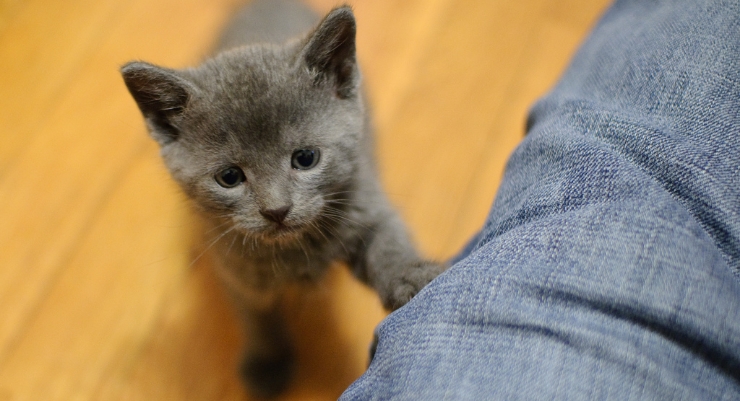
Jason was small and very much in need of comfort when he came to me.
After playing with the hearth broom, the fluffy tuxedo kitten toddled over to where I was lying on the rug and hopped on top of me. He stretched out full-length along my throat and fell asleep.
In the weeks that followed, Jason bonded with me as no cat ever had before. Wherever I went, he was right behind me — his fluffy little black tail waving proudly.
The Mother–Kitten Connection
Basically, Jason had a bad case of separation anxiety. The bond between a kitten and his mother is, according to animal behaviorist Nicholas Dodman (The Cat Who Cried for Help), “the most important one it will have.”
“If, when the kitten cries, its mom routinely responds, it will develop confidence,” Dodman says. “If she grooms it regularly, its nervous system will literally sprout. Well-tended kittens have higher self-esteem, are smarter, and seem to regulate their emotions better.”
At 8 to 12 weeks (responsible breeders prefer to go with the 12-week mark), the kitten will most likely be separated from his mother and go to a new home. And he will be traumatized. Your first day at kindergarten will have nothing on it.
That’s when you have to step in.
You have to “tend to the kitten’s demands, just as its mom might have,” explains Dodman. “This way, you keep the kitten on the right track regarding its intellectual and social development.” In the process, the kitten attaches itself to you, and you have the beginning of a beautiful friendship.
Imprinting
Most of us are familiar with the story of naturalist Konrad Lorenz and the goslings who bonded with him because he was the first thing they saw when they hopped out of the incubator.
It’s called “imprinting,” and that’s essentially what your new kitten is doing. Once that has happened, he will cease to mourn his lost mom and the litter mates. It’s not a bad idea to get him another kitten to play with, though: He’ll work off a lot of pent-up energy and be much happier.
In all probability Jason was too young to leave his mother, which was why he attached himself so intensely to me. Many years later, Magwitch, my snowshoe Siamese-cross, exhibited similar behavior. He and his litter mates had been found near a construction site. The mother cat was nowhere to be found, and rescuers guessed that she had been spooked by all the noise.
One night after I adopted him, I went out to the garage. I flicked on the light. There, clinging to the top of my sneaker by his baby claws, was my little Siamese-y guy.
This video shows a determined kitten trying to keep up with faster human legs:

A Breeder’s Eye View
Many ads for purebred cats emphasize that the kittens are “raised underfoot, with love.”
It’s not just an advertising ploy: Good breeders know that this kind of socialization is important when you’re breeding for personality as well as for looks.
“We handle them from birth to achieve human imprinting,” explains a breeder of traditional Apple-head Siamese and Balinese.
Sometimes, as with Bengals and Savannahs, it’s vital. Both are the results of crosses between domestic cats and wild cats. In the Bengal’s case, it’s the Asian leopard cat. In the Savannah’s, it’s the serval, which can be temperamental.
“Human imprinting has been used for thousands of years in the domestication and taming of wild animals,” observe the caretakers of Belle Hollow Savannahs. Their F-1 (first filial generation) Savannahs are taken from their mothers at birth. The F-2 (second filial generation) kittens get to stay with mom until day 5. The “close contact of human imprinting helps allay the natural serval side of the Savannah personality.”
Second Kittenhoods
Then there are the rescues. Domestic cats who have been abandoned and/or abused often do a little imprinting of their own once they feel safe.
Dulcie, one of our foster cats, started following me around like a puppy almost immediately — and continued to do so for the rest of her stay.
It was probably a natural reaction from a cat who had been unkindly treated in her previous home. Or maybe for her, it was a second shot at kittenhood.


